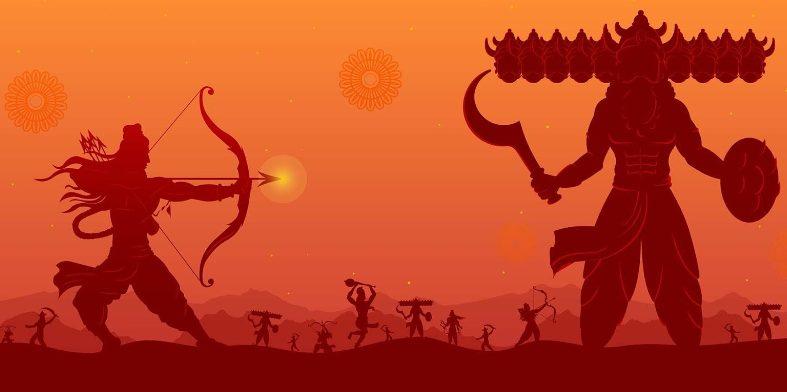The Hindu Pathans living along the Pakistan-Afghanistan border are a living testament to the power of culture, tradition, and resilience. Their commitment to preserving Dussehra and other Hindu customs in a predominantly Muslim region exemplifies the strength of cultural identity. As they gather to celebrate Dussehra each year, they not only keep their legacy alive but also serve as a source of inspiration for cultural preservation and harmony amidst diversity.
Yograj Sahni is one such example of this. He is a Pashto-speaking native of Thal and Bannu towns in Pakistan’s “wild west,”. Yograj prefixes “Hindu” to any conversation about his Pathan ancestry. This year’s Dussehra ritual for Ravan Dahan will be his 72nd since he, his family, and other battle-weary natives migrated to India. Yograj, 84, reminisces about his family’s home near the Afghanistan border and the salt mounds, mentioning that their kin traded in the commodity.
In the rugged and culturally diverse region along the Pakistan-Afghanistan border, Yograj’s inspiring story of resilience and cultural preservation unfolds. Amidst the predominantly Muslim population, a small community of Hindu Pathans continues to uphold their traditions, with Dussehra being a shining example of their commitment to preserving their cultural heritage.
Migration of Hindu Pathans to central India
Seated in the living room of his home in Nagpur’s Kadbi Chowk, Yograj points to turbaned men standing on craggy terrain with cartridge-stuffed bandoliers strapped across their chests. The mustachioed gent in the portrait is Yograj’s grandfather, Maniram, standing next to a gun-wielding figure he identifies as Jairam.
He said, These are people who migrated to central India just before and after Partition. They carried all their belongings with them, along with the dogmas of the Sanatan Dharma they were born into.
Three men died defending their village in Bannu from Afghan tribesmen, highlighting the importance of guns in the Hindu Pathan culture. The Hindu Pathan community’s enthusiasm for Dussehra rituals remains unchanged, with both Hindus and Muslims stashing ammunition in their homes.
The Hindu Pathans are a distinct and unique community, primarily living in the Khyber Pakhtunkhwa province of Pakistan and bordering regions of Afghanistan. They are a minority within a minority, as they are not only Hindus in a predominantly Muslim region but also identify as Pathans, sharing many cultural traits with their Muslim neighbors. Despite the odds stacked against them, these resilient individuals have maintained their Hindu identity, customs, and festivals over generations.
The Preservance of Dussehra in a Muslim Majority Country
Dussehra, also known as Vijayadashami, is a major Hindu festival celebrated across the Indian subcontinent. It symbolizes the victory of good over evil, commemorating the defeat of the demon king Ravana by Lord Rama. The festival is marked by the worship of deities, cultural performances, and the burning of effigies of Ravana, a custom that signifies the triumph of righteousness.
For the Hindu Pathan community living along the Pakistan-Afghanistan border, Dussehra is not just a religious festival. It is a testament to their unwavering commitment to preserving their cultural roots. Despite the challenges of being a minority in a predominantly Muslim region, they continue to celebrate Dussehra with great enthusiasm.
Dussehra brings the Hindu Pathan community together in a spirit of unity. They gather in small temples and community centers, adorned in vibrant attire, to offer prayers and partake in cultural performances, including traditional dances and music.
The burning of effigies of Ravana, his brother Kumbhakarna, and his son Meghnad, symbolizing the victory of good over evil, is a key component of their celebrations. This ritual serves as a reminder of the age-old epic, Ramayana, and the significance of righteousness in their lives.
The community takes pride in passing down their cultural heritage to younger generations. Parents and elders share stories, traditions, and rituals, ensuring that the legacy of Dussehra lives on.
Living as a minority in a region with religious and cultural differences comes with its own set of challenges. The Hindu Pathans face occasional discrimination and prejudice, making their commitment to preserving their culture even more remarkable. Despite these obstacles, their dedication to their heritage and traditions is a testament to the enduring power of cultural identity.
Dussehra celebrations among the Hindu Pathans also serve as a symbol of inclusivity and unity within diverse communities. The celebrations often attract members of the Muslim majority, fostering interfaith harmony and cultural exchange. This inclusiveness demonstrates the potential for shared cultural experiences to transcend religious divides and promote social cohesion.


